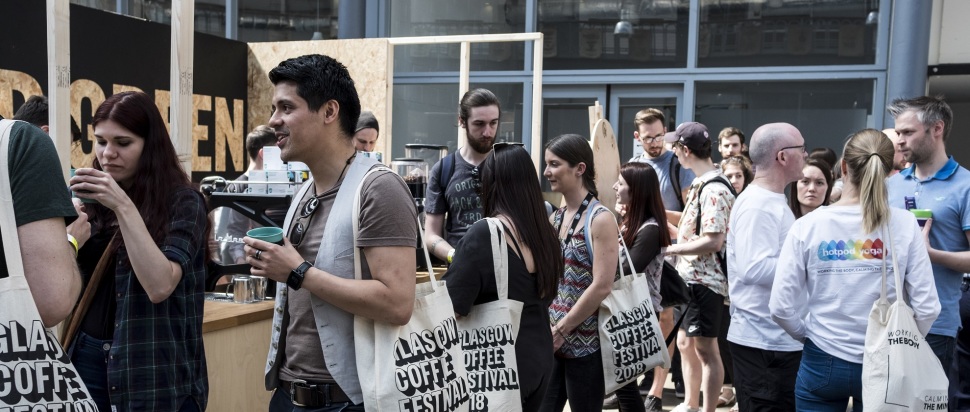Cleaning Up: Glasgow Coffee Festival & sustainability
Glasgow Coffee Festival is a disposable cup-free zone. We talk to organiser Lisa Lawson about how the festival – and the world of coffee in general – can be more environmentally friendly
Scotland’s selection of festivals seems to be ever-growing, from all-day gin festivals in big sheds to weekend-long music blowouts in big fields, via more than one month-long celebration of cocktails. There’s a lot going on, and it all has an environmental impact. Take a car full of people for a pint or to a campsite, that’s fine; multiply that car by a few thousand and you might have some issues.
So it’s good when festivals find ways to try and reduce their environmental footprint. In 2018, Glasgow Coffee Festival became the first coffee festival to completely rid itself of disposable cups, and they’ll do so again this year. Attendees can put down a deposit on a reusable cup to hand back at the end of the day, or… you know… just bring their own. From home. In a bag.
But how did this ‘do as we say’ approach go down? “We had an overwhelmingly positive response before, during and after the event,” the festival’s Lisa Lawson tells us via email. “We weren’t quite sure what response to expect from vendors and visitors alike.
“We enlisted the support of KeepCup to help us achieve the ban by being able to supply reusable cups to all visitors upon arrival at the venue. Espresso Solutions supported with cup rinsers to allow cups to be washed throughout the festival. We couldn’t have achieved the result we did if it was not for the camaraderie of the industry and the acceptance of the festival attendees! [It] was a very proud moment!”
Coffee, famously, is an industry that has a big supply chain and involves moving lots of physical stuff from one side of the world to another. As much as it’s good to discourage a disposable-heavy mindset, it is important to be mindful of the bigger picture. In addition to Glasgow Coffee Festival, Lawson runs Glasgow’s much-loved Dear Green Roasters, so we ask what the coffee industry in general can do to reduce its impact.
“Implementing good and sound practice in all we do at each part of the supply chain will have a positive environmental impact. Sustainable farming practices, increasing efficiencies of transportation and storage, using energy efficient equipment for processing, milling, roasting and brewing. Having general rules around reducing CO2 production, reducing waste, repurposing, reusing, composting and sourcing locally where possible.
“Everything you would apply to another business model to make it greener can be applied so easily to each aspect of coffee production... We also have to engage the consumer enough to move away from mass production and choose a well sourced product which will undoubtedly have taken a better environmental path to their palate.”
This year’s Glasgow Coffee Festival features dozens of just those kind of producers – small roasteries that take real care in sourcing their product, farmers who keep their milk organic and as good for the planet as possible, and guys who make cups that you wouldn’t even want to throw in the bin if you were allowed. Making use of all of these people will help you enjoy your coffee knowing you’ve cut your environmental impact a touch.
“Drink your coffee from a reusable cup, always,” says Lawson when asked for what you should do to make your morning flat white better for the planet, adding that a disposable cup – no matter its environmental bona fides – will inevitably end up in one bin or another.
“Choose to drink coffee from a trusted cafe or roastery where you are sure there is transparency in sourcing and the value chain directly to the coffee picker. Most likely you’ll then be investing in the farmer receiving more money for his crop and therefore more access to education on sustainable farming practices.”
Glasgow Coffee Festival, The Briggait, 4-5 May
